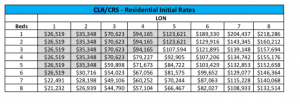S.B. 397 An Act Concerning the Department of Developmental Services' Level of Need Assessment
DATE: March 8, 2021
TO: Public Health Committee
FROM: Ben Shaiken, Manager of Advocacy & Public Policy, The Alliance
RE: S.B. 397 An Act Concerning the Department of Developmental Services’ Level of Need Assessment.
Good morning Senator Abrams, Representative Steinberg, Senator Hwang, Representative Petit and distinguished members of the Public Health Committee.
My name is Ben Shaiken, Manager of Advocacy & Public Policy at the CT Community Nonprofit Alliance (The Alliance). The Alliance is the statewide association of community nonprofits. Community nonprofits provide essential services in every city and town in Connecticut, serving more than half a million people in need and employing 117,000 people across the State. They are an important part of what makes Connecticut a great place to live and work and an important piece of our economy.
Thank you for the opportunity to comment on S.B. 397 An Act Concerning the Department of Developmental Services’ Level of Need Assessment, which would establish a task force to examine the Level of Need Assessment system and improve the utilization of that system.
In Connecticut, people with I/DD who are supported by the Department of Developmental Services (DDS) and community providers conduct assessments for services, using the “Level of Need Assessment and Screening Tool,” referred to as the LON. Individuals are given an overall LON score between 0 and 8, with 8 being the highest level of need based on the assessment of a number of factors, including health and medical, personal care activities, daily living activities, behavior, safety, and more. The LON score is part of the information used to develop and annually update an Individual Plan (IP), which determines the appropriate levels of residential and day supports for the individual. The development of an IP is a collaborative process involving the DDS case manager, the individual, their family, private providers who are part of the individual’s support team, and others.
Community providers offer a range of residential and day supports to people with I/DD. The rates providers are paid for the services they deliver are directly tied to an individual’s LON score. Below is a table of the FY19 rate structure for Community Living Arrangements and Community Residential Supports (CLA/CRS), commonly known as group homes, to illustrate how LON scores impact the level of services and supports required, and therefore the amount of funding for residential placement.

Attached is the full FY19 Interim Rates, which illustrates how the LON score impacts nearly all reimbursement rates providers receive for the services they deliver.
The LON was developed as an objective assessment tool, but the fact that it is tied directly to rates leads to an inherent conflict between appropriate funding and an individual’s assessed need. In an environment with limited funding and perpetual state budget cuts, decisions about new services offered to people not currently receiving them, and the rates paid for those services cannot be made without considering whether funding is available. While “availability of funding” is not a factor the LON tool evaluates when determining an individual’s score, because the score is tied directly to rates, it inevitably leaks into the equation.
The LON can be an imprecise and imperfect way to assess people who have complicated and unique needs. Reducing the results of its questionnaire to a score of 0-8 and then tying that score to eligibility of services and provider funding creates challenges to the delivery of individualized services to each person based on their unique needs. For an assessment tool to be fully objective, it must be uncoupled from provider rates.
However, because the rates are directly tied to the payment private providers receive for services, any process seeking to make changes to the LON system should be open, thoughtful, planned, and inclusive of provider feedback. The Alliance requests that any legislative proposal to change the LON system include language mandating that providers, family members and people with I/DD be a part of the decision-making process. Too often across the country, states hire out-of-state consultants to redesign their rate structures and the recommendations they make have devastating effects on providers, the people who work for them and the people they support.
Further, we appreciate that S.B. 397 is a Proposed Bill, and if the Committee chooses after today’s hearing, will be drafted into full legislation. The Alliance also requests that the term “within available appropriations” is not included in such legislation, should it be drafted. Since the current LON system is tied to rates, any changes to the system will impact the rate structure. Current rates are tied to the availability of funding rather than the true cost of delivering the service, and there is a waiting list of several thousand people with I/DD because of the lack of available funding. Because of how closely the LON is tied to funding, it is impossible to change the LON in a way that will better serve the residents of Connecticut “within available appropriations,” and mandating the change be cost-neutral may do more harm than good.
Thank you for your consideration of this important issue.
All Campus
Receive up to 15% on tuition with participating university program.
FairField University
20% Tuition discount in our MPA and Non-Profit Management Certificate
Get Social With The Alliance
Connect with us on our social media. For frequent updates, be sure to follow and like us on all of our platforms below. You’ll see postings about our latest campaigns, events, and news.
Act Now! Contact Your Legislator
Tell legislators to add $461 million to community nonprofits! Email your legislators today to ask that they increase funding for community nonprofits by $461 million over five years.
CT's only jobs board exclusively for nonprofit employers and job seekers. Nonprofit employers can recruit for open positions and post your job in front of the most qualified group of nonprofit professionals in the industry.
